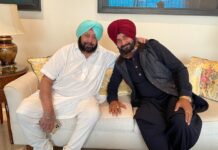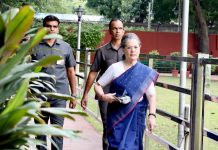 New Delhi (IANS): A.P.J. Abdul Kalam backed the nuclear deal India inked with the United States in 2005 and it is a “total canard” that the then president (Kalam) was reluctant to appoint Sonia Gandhi as the prime minister, former prime minister Manmohan Singh has said.
New Delhi (IANS): A.P.J. Abdul Kalam backed the nuclear deal India inked with the United States in 2005 and it is a “total canard” that the then president (Kalam) was reluctant to appoint Sonia Gandhi as the prime minister, former prime minister Manmohan Singh has said.
“This is a canard being spread (about Kalam’s reluctance)… there is no truth in that,” said Manmohan Singh in his first interview since demitting office. The interview to Karan Thapar on India Today TV was telecast on Wednesday.
“Kalam never questioned who will spearhead… that was a privilege given under the constitution to the party. Anything that is said on that area would not be true,” the former prime minister said.
Manmohan Singh confirmed that Abdul Kalam gave him great support during the run-up to the Indo-US nuclear deal of 2005 and said he spoke to Samajwadi Party leaders Mulayam Singh and Amar Singh to persuade them to support the deal rather than vote against it.
“I took the precaution of keeping the president fully in picture… There was opposition within the scientific community,” Manmohan Singh said adding that having Kalam on board was a great help in going forward with the deal.
The former prime minister said he suggested to Mulayam Singh to go meet Kalam who “totally endorsed” the nuclear deal.
About his relations with Kalam, who passed away on Monday, Manmohan Singh said: “I always felt I had a friend and an adviser in the president… those were the happiest moments I spent in his company.”
“I also worked with him when he was the chief of Defence Research and Development Organisation; his contribution to self-reliance in defence technology was phenomenal. I would see him at times at odd hours carrying a file… if Kalam said so I put my signature to many files,” the senior Congress leader said.
“I served him as the prime minister for more than three years; he was the one who administered oath of secrecy to me. My relationship with him was that of great friendship; he recognised the problems I had in managing a difficult coalition government,” Manmohan Singh said.
“I took caution of keeping the president fully in the picture (on the nuclear deal),” the former prime minister said, adding he briefed Kalam on all developments with regard to the deal.
“I was very happy when he endorsed what we were doing,” he said.
“When I faced a vote of confidence, he was not the president but he still played an important role,” the senior Congress leader said.
He said the situation was difficult and he discussed it with Samajwadi Party leaders Mulayam Singh and Amar Singh.
“I was discussing these matters with Amar Singh ji, and Mulayam Singh ji… with great difficulty we managed to persuade them to have a relook at their stand. It occurred to me that Mulayam Singh had great regard for Kalam….”
Manmohan Singh said he then urged the SP leaders to meet Kalam.
“They went to see Abdul Kalam… he told them this deal is in national interest… and we won the vote of confidence.”
The United Progressive Alliance (UPA) government, elected in 2004, faced its first confidence vote in the Lok Sabha on July 22, 2008, after the Communist Party of India (Marxist)-led Left Front withdrew support over the Indo-US nuclear deal.
In the 543-member Lok Sabha, the UPA needed 272 votes for the government to enjoy a simple majority.
The UPA won the confidence vote with 275 votes to the opposition’s 256, with 10 members abstaining. The SP, with its 37 members, voted for the government, playing an important role in allowing the government get through the vote of confidence.
Manmohan Singh said he remembered him as a “caring president who was very fond of meeting people, who wanted to see science and technology play its role in development”.
Commenting on Kalam’s death while delivering a lecture at IIM Shillong, Singh said: “…to go from the world in this manner is also a unique experience.”
Asked if the former president would have liked to die in this manner, the former prime minister said: “That is true.”
“History will remember his as a great president, a great nation builder, a person who did a lot to promote the cause of self-reliance in defence technology. The overall judgment of history will be that Kalam was a great president; we have lost a great son of India,” he added.












